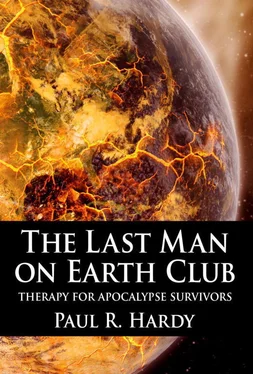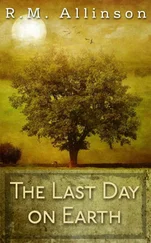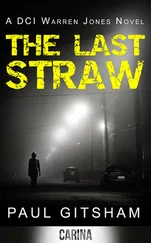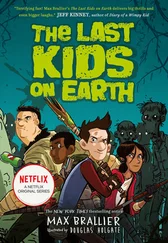She left, without any further acknowledgement of my point. She was right, in some ways; PTSD is far from an automatic response to trauma. But the likelihood does increase massively according to the length of exposure to traumatic events, and her symptoms made anything else implausible. And maybe I’d have pushed it further that day, but I decided me and my arm needed some rest.
Kwame sat in a darkened room, watching a series of lights pulse across a curved wall. I was next door, shut away with the tomographer and a neurologist so our own nervous systems would not disturb the readings.
We’d taken him to Hub Metro for the calibration. While we had enough equipment at the centre to monitor his medical condition and were installing more for the dream recording, it took a rather finer set of instruments to get the baselines we needed before we could begin. The entire room was a tomographical scanner, taking millions of sectional images of his entire body every second and building a full model of his mind.
“Ah, there, you see?” said Professor Ebbs, eyes sparkling with the happy light of a scientist seeing his hypothesis confirmed. “The visual cortex is routed differently than in most species, thanks to the latent hibernation ability…”
“Really?” I asked, doing my best to conceal annoyance at his condescension.
“Well, of course, you knew that. But it’s following the pattern we might expect in other hibernating human species. The visual cortex runs differently during REM sleep, and differently still during hibernation…”
“He’s drifting again,” said the tomographer. Kwame was supposed to concentrate on a point of light in the middle of the wall.
I activated the intercom. “Kwame? You need to look at the white dot.”
“Of course. Forgive me.”
“Do you need a break?”
“No. Please continue.”
“Here comes sequence fourteen,” said the tomographer. She switched off the intercom and turned to me. “It’s better if you keep him talking. He’s having trouble concentrating.”
I switched the intercom back on. “How are you doing, Kwame?”
“This is a surprisingly difficult task.”
“You’re doing fine. Just keep it up and we’ll be back home in time for dinner.”
“Yes.” He sighed and concentrated on the dot. “May I ask a question?”
“Go ahead,” I said.
“What happened to your world?”
“I think I told you already.”
“I mean since then.”
“Oh. Well…” I glanced at the tomographer. She shrugged. “It’s not exactly somewhere you’d want to go on holiday.”
“You said you never went back.”
“No. There’s not much to go back to.”
“Is your world dead?”
“Very nearly.” I sighed and looked over my shoulder. Professor Ebbs and the tomographer did their best to pretend they weren’t interested. They’d never been refugees, and doubtless liked to hear the horror stories. “There are still some people there. We’ve been trying to get them out for decades but they refuse to go.”
“I imagine you have trouble understanding their determination.”
“No, not at all. It’s the homeworld. They want to keep it going as long as possible. Plus they’re mostly religious fundamentalists, so they think we’re the devil.”
“Every species has that kind of fool.”
“Yes, I suppose it does.”
“Will they survive?”
“No. The volcano is still erupting. There’s so much sulphur dioxide in the atmosphere they have to stay underground and filter the air, but they can’t last forever. The last time they let us take a look at them, life expectancy was down to thirty-five years. That was ten years ago.”
Kwame didn’t answer.
“Kwame? Are you still there?”
“Yes. I was reflecting on the last people who survived on my world. They were in bunkers as well.”
“As far as we know, yes.”
“Some of them held out for decades. Watching the radiation meters. Hoarding their seedbanks. Hoping the fallout would wash away. Watching the next generation grow up hopeless and defeated. Thinking they were the last ones left. Probably cursing me if they knew what happened…”
“He’s drifting,” said the tomographer.
“Keep your eyes on the dot, Kwame,” I said.
“Yes. Sorry.”
“Would you like to talk about something a bit more current?”
“I don’t… no, wait. May I ask you another question?”
“Go ahead.”
“Your world had leaders, yes?”
“Of course.”
“Did they act appropriately when the volcano erupted?”
“Not all of them, no. Some of them went to war over resources. That’s why there was a nuclear exchange. Even after that, some decided to delay the evacuation, over the advice of their scientists. A lot of people died.”
“Were they prosecuted?”
“Some were. Those that survived.”
“Were they convicted?”
“Yes. Well, a couple got off because they were prevented from starting the evacuation by legislatures, but most of the ones who caused unnecessary delay were found guilty. I can see where you’re going with this.”
“Does it give you satisfaction? To know they were convicted and punished?”
“It doesn’t bring anyone back.”
“How would you feel if they escaped justice?”
Professor Ebbs and the tomographer had given up trying to hide their interest. “I’d be angry. Is that the answer you were looking for?”
“Yes.”
“Your situation is different. My species has a government and judiciary. They put the leaders on trial, not the IU. The IU can’t hold those kind of hearings. We don’t interfere in internal matters.”
“Not even if millions of lives are at stake?”
“We offer help. We can’t do much if people say no.”
“Even if their governments are fools?”
“Even if.”
“And so millions die.”
“We have a non-intervention policy for a reason.”
“Yes. I know. It is very well reasoned and thought out, and the justifications make perfect sense. From the point of view of bureaucrats living comfortably on Hub.”
“I can understand you’d have a different point of view…”
“I am sure you can.”
“You’ve been through a terrible experience…”
“I simply hoped you might share my point of view. Given your own terrible experience.”
I leaned back in my chair, sighed and rubbed my temples. The Professor leaned into the mic.
“Hello Kwame. Ebbs here.”
“Professor.”
“I know it’s a bit rough and all, but at least you’ll be able to see your wife soon. Well, an image of her, at any rate.”
I glared at him. Neurologists tend, in my opinion, to assume a greater knowledge of human character than they actually possess.
“I don’t even remember what she looked like,” said Kwame.
“You won’t have that problem for much longer. I can promise you that,” said the Professor. I switched off the mic in our booth.
“Professor,” I said, shaking my head. He frowned.
“Ah. Not very tactful?”
“Not very tactful at all.”
“I do apologise…”
I switched the mic back on. “Sorry about that, Kwame. Keep your eyes on the dot.”
“I am fine,” he said. “It will be good to see her without…”
“He’s closed his eyes,” said the tomographer as half the screens flatlined.
“Do you need a break?” I asked.
“Yes. Please,” said Kwame, sitting alone with his head in his hands as the lights in the room came up.
That evening, once I’d returned Kwame to the centre and he slept under a sedative, I noticed Iokan heading to the infirmary. I’d let the group know they could visit Elsbet if they liked, since she’d been informed of their existence, but warned them not to mention Katie. Iokan was the first to take up the offer.
Читать дальше












